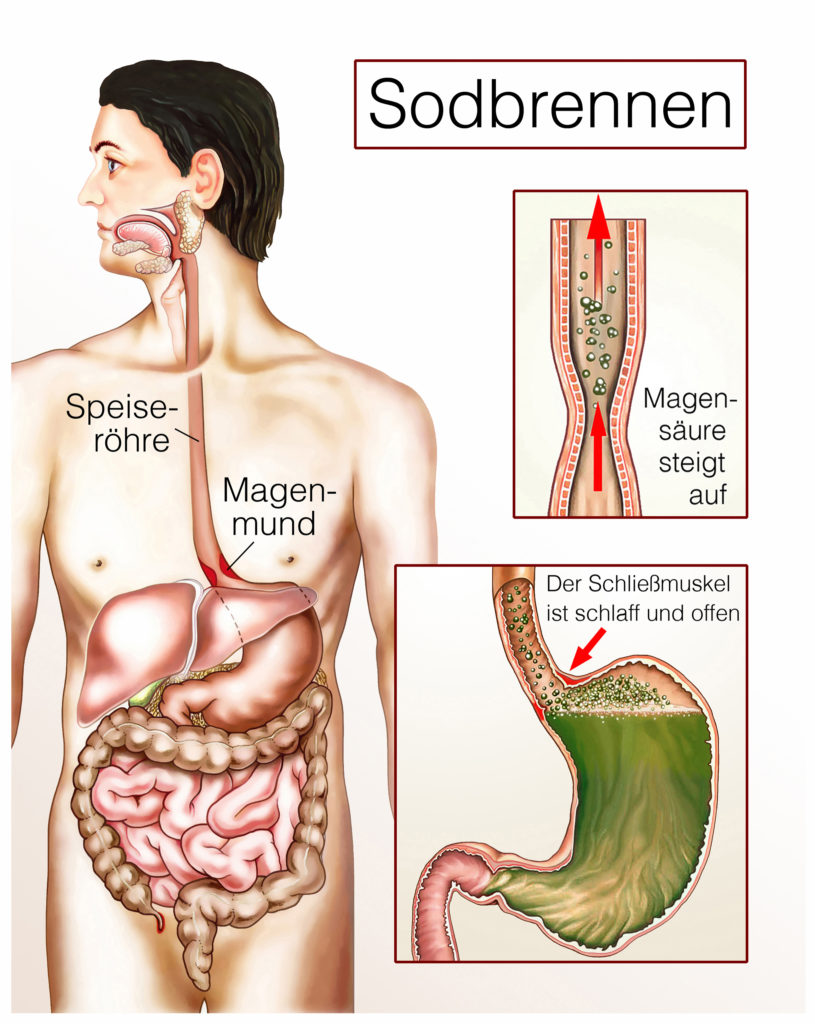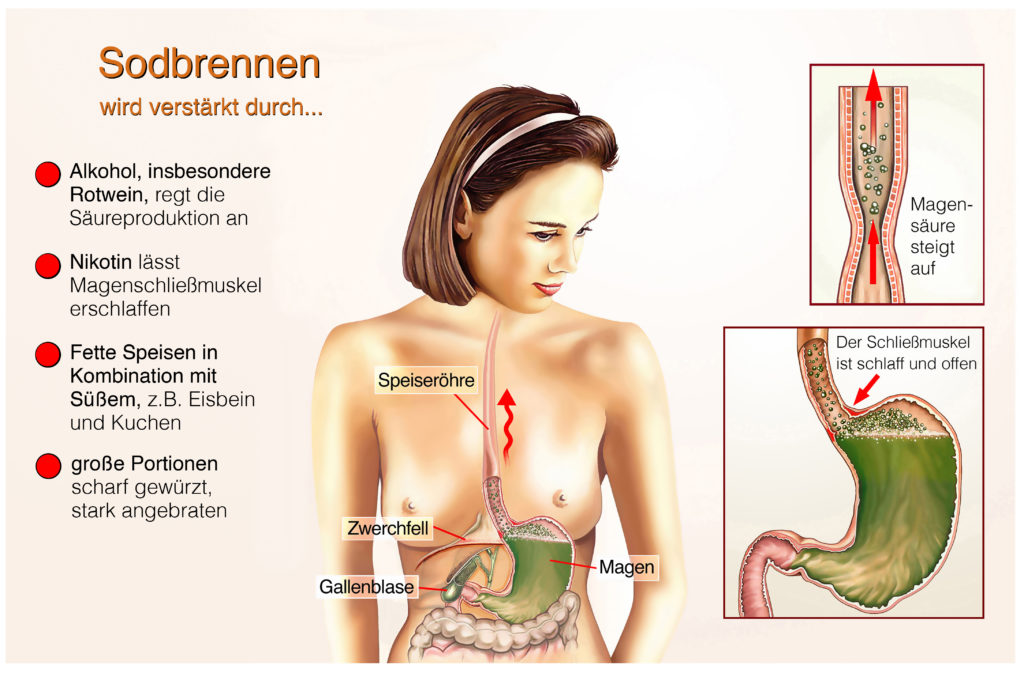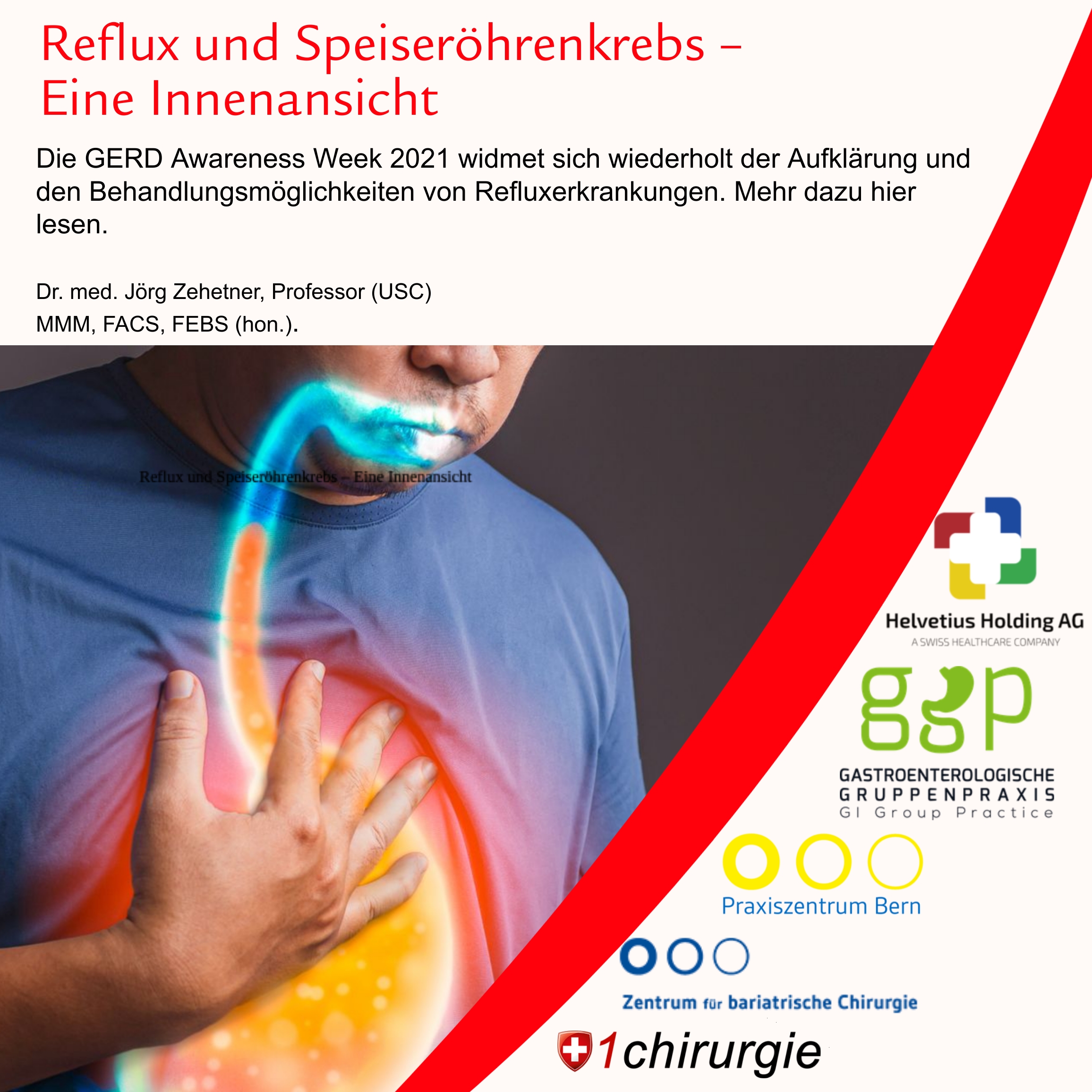GERD Awareness Week runs from 21 to 27 November 2021. GERD stands for Gastroesophageal Reflux Disease, or reflux disease for short. About 20 percent of the population is affected. The individual appearance and extent can be very different. On the occasion of GERD Awareness Week, we want to focus on reflux disease, possible secondary diseases and targeted diagnosis and treatment. The very personal view of those affected is just as important to us as the possibilities of surgical intervention and the chances of prevention and targeted aftercare.

Acid reflux is more than just unpleasant
As part of GERD Awareness Week, Swiss1Chirurgie is once again stepping up its efforts to raise awareness of reflux diseases, which are often heralded by chronic acid regurgitation or are already present. The range of perception of reflux disease, which continues to be on the rise, at least in certain population groups, extends from initial individual perception to specialist medical diagnosis and surgical intervention. Read more about the topic in the article.
Sour reflux, the personal view
Oops, there it is again. This unpleasant regurgitation of acidic gastric juice with that well-known disgusting feeling. Stomach fluid and, in individual cases, food components rise from the stomach into the oesophagus and, in addition to the bitter aftertaste, cause a feeling of discomfort. Many people complain about heartburn, especially after a rich, fatty or spicy meal, but give little thought to the causes and possible consequences. Incidentally, alcohol consumption, being significantly overweight and smoking also contribute to the development and intensification of reflux disease. It becomes really annoying when this acid regurgitation occurs more frequently and recurrently. Then we are already talking about chronic belching, which can definitely have disease value. In the final analysis, it will be important to find an experienced doctor now who is actually well versed in the diagnosis, treatment and aftercare of reflux disease. The first path is then usually to the family doctor, who should then find the appropriate specialist as a referrer. In any case, it is important not to take chronic acid reflux lightly, but to seek a specialist medical opinion at an early stage. After all, what started out as occasional belching can quickly become more, with correspondingly serious consequences.
When chronic belching turns into cancer, the medical perspective
The path from chronic belching to oesophageal cancer is in many cases shorter than commonly assumed. The sensitive mucous membrane of the oesophagus is attacked and seriously damaged by the repeated rising of gastric juice in the oesophagus. As the disease progresses, cell growth disorders develop which, in serious cases, can lead to uncontrolled cell growth and thus to oesophageal cancer.
At an early stage, the patient hardly feels anything, so that only a timely medical diagnosis and intervention can provide information and ensure adequate treatment. If the oesophagus is already severely damaged and a clear cancerous growth is present, the patient will experience clear difficulties in swallowing and possibly also a feeling of pressure in the chest area, which can hardly be clearly localised by the patient himself. A specialist medical diagnosis is then urgently required in order to be able to intervene in time. Waiting does not improve the situation, but rather leads to a worsened overall situation.
Therefore, in every case of frequent acid reflux, it is advisable to consult a medical specialist as soon as possible in order to be able to professionally assess the concrete situation and a possible dangerous situation in the diagnostic process. Commercially available heartburn remedies can alleviate the process, but not effectively stop or halt it.
Surgical intervention, the necessary intervention
If surgery is required for reflux disease, the experts at Swiss1Chirurgie prefer to use minimally invasive surgical methods. This does not address the symptom, but the cause. The cause of chronic acid regurgitation is often found at the transition between the oesophagus and the stomach and often also in the passage area at the diaphragm. The valve at the entrance to the stomach, let’s call it a valve, no longer closes properly or is otherwise impaired in its function, so that acidic gastric juice can keep rising to the top. It is not uncommon for the pumping function of the oesophagus to be disturbed, which can be determined in a function test.
In Swiss1Chirurgie, a system is used where possible in which an elastic magnetic ring is placed around the oesophageal valve. This magnetic ring closes the transition from the oesophagus to the stomach, but allows food to be taken normally, provided the pressure in the oesophagus is normal. A slight burst of air also remains possible.
You can find comprehensive and convenient information about this procedure and other options for treating reflux disease on our website.
Vulnerable groups and trend
Reflux diseases mainly affect people who have weaknesses at the transition from the oesophagus to the stomach. A large group of patients is recruited from the overweight group. Even if this does not represent the sole risk, obesity is a decisive factor in reflux diseases. Excessive fatty and spicy food also provokes reflux disorders, as does excessive alcohol consumption or smoking.
It can be assumed that reflux diseases will continue to increase. This is caused by people’s eating habits and the excessive use of stimulants. An overall healthy lifestyle can also prevent reflux disease, although even apparently healthy people can be affected.
What remains to be done
Those who already complain of reflux symptoms should especially check their eating habits. Greasy food, large portions, sour and spicy food should be avoided as well as too much coffee, chocolate, alcohol and nicotine. Weight reduction is advisable in many cases.
If even then there is no short-term improvement, a visit to the family doctor or directly to an expert for reflux diseases is essential. Only there can the situation be mapped clearly and unambiguously, which is ultimately the surest way to an accurate diagnosis and subsequent treatment.
You will also find extensive material on the possibilities of influencing reflux diseases on our website.
For professional colleagues, we recommend participation in the referral event on 25 November 2021 as part of GERD Awareness Week 2021.


